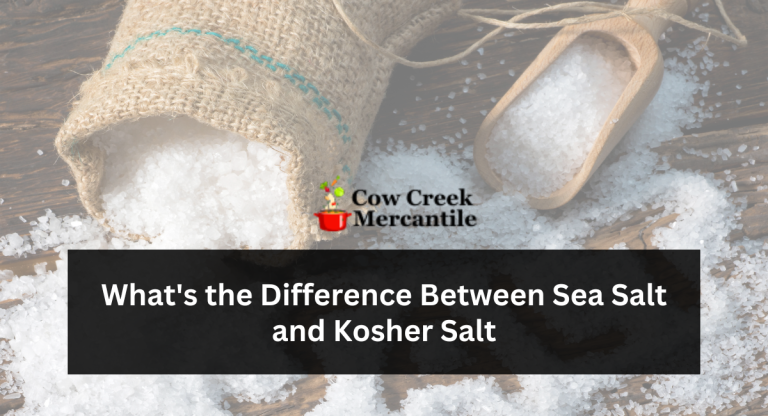In the world of seasoning, salt reigns supreme. It’s a fundamental ingredient in virtually every cuisine, enhancing flavors and making dishes sing. While table salt is the standard in most households, there are two other contenders that have earned their place in kitchens around the world: kosher salt and sea salt. But what sets them apart, and how do you choose the right one for your culinary adventures? Join us as we dive into the nuances and distinctions between kosher salt and sea salt to help you elevate your cooking game.
Kosher Salt: The Classic All-Rounder
Kosher salt is known for its large, coarse grains that originate from salt deposits. Initially used to draw blood from meat and make it kosher, kosher salt has since become a versatile kitchen staple. Unlike table salt, kosher salt contains no additives or iodine, which can impart a metallic taste to some dishes. This pureness makes it an excellent choice for those seeking a clean, salty flavor without any unwanted bitterness.
Kosher salt comes in both coarse and fine textures, with two main brands dominating the market: Morton’s and Diamond Crystal. It plays a crucial role in cooking, but due to its lighter weight compared to table salt, it cannot be directly substituted in recipes. However, a simple conversion can guide you on how to incorporate kosher salt effectively.
Beyond cooking, kosher salt has other practical applications, such as cleaning and preserving food. Its versatility makes it a valuable addition to any kitchen.
Sea Salt: Nature’s Bounty in a Jar
Sea salt, on the other hand, derives its unique character from the evaporation of ocean water. It boasts fine grains with uneven flakes, resulting in a lack of uniformity in shape, size, and color. This variation makes sea salt available in different sizes, offering chefs and home cooks more choices to suit their preferences.
Like kosher salt, sea salt is free from iodine, but it retains some minerals due to minimal processing. These minerals, such as potassium, lend a nuanced flavor to sea salt, enhancing its appeal for those seeking a slightly more complex taste.
One notable distinction between sea salt and kosher salt is the price. Sea salt often commands a higher price point, sometimes exceeding double the cost of kosher salt. As a result, it is typically reserved for use as a finishing touch or garnish rather than being incorporated into recipes.
In addition to culinary use, sea salt has found its way into body scrubs and bath products, thanks to its reputation for promoting relaxation and soothing muscles.
Deciphering the Differences
Origin:
The primary divergence between kosher salt and sea salt lies in their origins. Kosher salt is mined from salt deposits, while sea salt is the product of evaporated ocean water.
Price:
Sea salt comes at a premium, often costing more than twice the price of kosher salt. This difference in cost influences how each salt is used in cooking.
Texture and Size:
Kosher salt is known for its larger, coarse grains, making it easier to control when even salt distribution is crucial. Sea salt, with its fine grains and uneven flakes, lends a delicate touch to dishes.
Conversion Ratios:
When substituting one salt for another, it’s essential to consider the conversion ratios. To replace kosher salt with sea salt, use 1 teaspoon of kosher salt for every ¾ teaspoon of sea salt. For flaky sea salt, the ratio is 1:1. Conversely, if substituting sea salt with kosher salt, use 1 teaspoon of kosher salt for every ¾ teaspoon of sea salt.
Healthiness:
Despite claims of sea salt being healthier due to mineral content, there is no significant difference in health benefits among kosher salt, sea salt, and table salt. All three contain a similar amount of sodium, so choosing one over the other is mostly a matter of personal preference and usage.
Salt Selection: The Final Pinch
In the grand debate of kosher salt vs. sea salt, there is no definitive winner. The choice of salt depends on your culinary goals and preferences. As a general rule, use salt in moderation, regardless of the type.
Remember these key takeaways:
- Kosher salt boasts larger, coarser grains, while sea salt is finer.
- Neither kosher nor sea salt contains additives or iodine, but sea salt may contain trace minerals.
- Sea salt tends to be pricier than kosher salt.
- Sea salt is often used as a finishing touch in cooking or baking, while kosher salt is more common in recipes.
- Conversion ratios may vary between salt types, so be mindful when substituting one for another.
- Healthwise, there are no significant differences between salt varieties.
The world of salt is vast and flavorful, offering endless possibilities to enhance your dishes. So, embrace the diversity of kosher salt and sea salt, and let your taste buds be your guide on your culinary journey.

